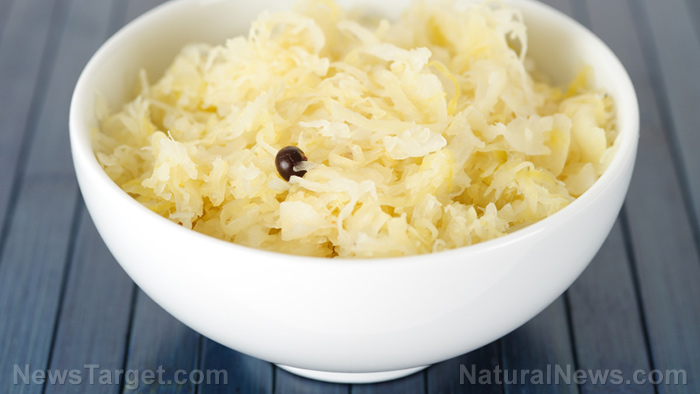- Traditional fermented foods like sauerkraut are now backed by science for gut health.
- UC Davis research confirms sauerkraut protects gut cells from inflammation and damage.
- Fermented foods offer natural, holistic gut health benefits surpassing synthetic probiotics.
- Chronic inflammation and modern diets contribute to widespread gut health issues.
- Simple, affordable fermented foods can prevent chronic illness better than pharmaceuticals.
For centuries, traditional cultures have relied on fermented foods like sauerkraut, kimchi, and kefir as natural remedies for digestion and overall health. Now, modern science is finally catching up.
A groundbreaking study from the University of California, Davis, reveals that sauerkraut—long dismissed as just a tangy hot dog topping—might be one of the most potent gut-protective foods available. The findings, published in Applied and Environmental Microbiology, validate what natural health advocates have insisted for generations: simple, fermented foods could be far more powerful than pharmaceutical solutions in promoting long-term wellness.
A long-overdue scientific nod to tradition
The research, led by UC Davis food scientist Maria Marco and postdoctoral researcher Lei Wei, examined how fermentation transforms cabbage into a gut-protecting powerhouse. By comparing raw cabbage, store-bought sauerkraut, and lab-fermented versions, they discovered something remarkable: the fermented product actively preserved intestinal cell integrity, shielding them from inflammation-related damage. Raw cabbage? No such benefit.
“Some of the metabolites we find in the sauerkraut are the same kind of metabolites we’re finding to be made by the gut microbiome, so that gives us a little more confidence that this connection we found between the metabolites in sauerkraut and good gut health makes sense,” Marco said. «It doesn’t matter, in a way, if we make sauerkraut at home or we buy it from the store; both kinds of sauerkraut seemed to protect gut function.»
This revelation is a win for traditional food wisdom. Sauerkraut, which is nothing more than cabbage, salt, and time, contains live bacteria and metabolites that mimic those naturally produced in a healthy gut. Unlike synthetic probiotics or digestive aids, fermented foods like sauerkraut deliver a holistic, food-based solution to gut imbalances.
Gut health isn’t just about digestion—it’s about survival
The gut microbiome influences everything from immune function to mental health, which is a fact mainstream medicine has only recently acknowledged. Chronic inflammation—often fueled by processed foods, stress, and antibiotic overuse—has been linked to autoimmune disorders, depression, and even neurodegenerative diseases. Yet instead of addressing root causes through diet, the pharmaceutical industry spends billions on medications that merely mask symptoms.
Fermented foods offer a different approach. The study found that sauerkraut’s fermentation process generates lactic acid, amino acids, and other metabolites that strengthen the gut lining. Rather than attacking “bad” bacteria with antibiotics, it nurtures a balanced microbiome. As nutritional therapies gain traction, this research suggests that adding beneficial foods may be more effective than restrictive diets alone.
“Along with eating more fiber and fresh fruits and vegetables, even if we have just a regular serving of sauerkraut, maybe putting these things more into our diet, we’ll find that can help us in the long run against inflammation,” Marco noted.
Industrialized food systems, pasteurization, and ultra-processing have stripped many foods of their natural bacteria and enzymes. The result? A global gut health crisis. Where traditional diets—from German sauerkraut to Korean kimchi—prioritized fermentation, modern convenience foods lack these protective elements.
Skeptics argue that probiotics and supplements can replace fermented foods, but research like UC Davis’s suggests otherwise. Whole fermented foods contain complex interactions of microbes and metabolites that isolated supplements can’t replicate. And unlike pricey wellness fads, sauerkraut is dirt-cheap, requiring only cabbage, salt, and a jar.
“A little bit of sauerkraut could go a long way,” Marco emphasized. “We should be thinking about including these fermented foods in our regular diets and not just as a side on our hot dogs.”
Healing doesn’t have to be complicated
The beauty of this study isn’t just in its findings; it’s in the simplicity of the solution. While Big Pharma chases blockbuster drugs, a centuries-old kitchen staple might hold the key to preventing (and not just treating) chronic illness. Pair sauerkraut with other fermented staples (kombucha, miso, yogurt) and fiber-rich plants, and the gut thrives.
For those burned out by relentless diet trends and prescription side effects, the message is clear: Sometimes, the best medicine is the food our ancestors trusted all along.
Sources for this article include:
